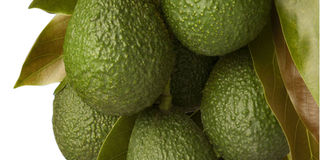Prime
Reaping benefits from Hass avocado

Hass avocados. PHOTO/FILE
What you need to know:
- There is quite a big hype around Hass avocados, but it actually is quite justified when it comes to how nutrient-dense this food is and the numerous commercial benefits.
Uganda’s avocado industry has experienced rapid growth in recent years thanks to companies such as Musubi Farm, which have worked to develop this product’s image in the global market.
The European market has been very important for Hass avocado growing but there are other market potentials especially in the Middle East.
Why Hass avocado
With the demanding international market opening up, farmers are advised to grow Hass avocado. Sulma Foods, an agro-processing and export firm in Luweero District is among the latest entrants in the business.
Sulma Foods Managing Director Abdul Karim Farid Karama, says that the market demands more Hass avocado. As a company, they have planted a mother garden from which they will propagate seedlings they will supply to farmers. The avocado tree has a lifespan of about 50 years. To Karama, this implies that a tree can benefit the farmer his entire life. Popularly known as the green gold, Hass avocado is rapidly growing in popularity among the farmers who look at it as an antidote to poverty.
Ready market
At the end of the 2009 avocado season, approximately 693,000 tonnes of avocados were exported around the world. In 2019, the number of avocados exported shot to 2,140,000 tonnes. Kenya is among the top 10 exporters while Tanzania, which started in the 2009-10 season with less than 100 tonnes, is gaining prominence.
“There is enough market for all of us to grow avocados,” says Karama.
Despite environmental challenges with the leading exporters Mexico and Chile, Uganda has an opportunity to squeeze in the market as it relies on smallholder farmers.
The Uganda government has already gone full throttle on Hass avocado growing.
The Parliamentary Committee on agriculture recommended Hass avocado as a worthy investment that must be supported.
Training
Musubi Farm, the leading growers of Hass avocado, istraining smallholder farmers wishing to switch to the crop providing them with seedlings.
The planting materials are pricey for smallholder farmers. A seedling costs about Shs5,000. This requires about Shs800,000 to plant 160 trees in an acre.
The vision shared by Musubi Farm is to use a more sustainable approach of smallholder farmers to supply their needs.
Small farms put less strain on the environment and at Sulma Farm for instance, they are able to use just three acres for a mother garden.
When one decides to plant an avocado orchard, there are multiple inputs that avocados require such as water, fertiliser, pruning and pest control in order to have a good-quality crop. The planting materials too should come from certified nurseries.
The biggest challenge to organic Hass farmers is the cost of management. In organic farming, the hoe has to be used for most tilling activities because one cannot use herbicides. For the farmers who want to enter the insatiable export market, Hass can be harvested commercially after three years. At five years, one can start getting a minimum of 600 kilogrammes per plant.
Countless benefits
Fair trade and organic certificates are among the most important aspects for those intending to tap into the export market. Karama explains that the main advantage with Hass avocados is its long shelf life of up to 56 days at about 6°C.
The Hass avocado can contain up to 18 percent oil. Avocado oil is extracted for cosmetic use because of its very high skin penetration and rapid absorption.
But it has other health values because it contains a variety of essential nutrients and important phytochemicals.
According to Karama, the biggest advantage with Hass avocado is its high market value which reaches $2 (about Shs7,000).
Land preparation
This should be similar to the preparation of land for the other crops. In the case of strong winds, ensure that wind breakers such as hedges are in place.
Planting materials
Avocados can be grown from either seedlings or from the seeds. However, Hass avocados, which are preferred in the export market, are best grown from grafted seedlings. Grafting improves the variety by increasing its resistance to diseases.
Spacing
The standard spacing for grafted Hass avocado is five by five metres. With this spacing, 150 avocado trees can be planted in an acre. However, tree spacing within the line can range from 3m to 5m while the space between the lines should be at least 5m and at most 7m.
The best practice is to dig the holes in a straight line. This will make tending to the trees and harvesting easy. The holes should be at least two feet but can be up to 1m deep. Soil samples should be taken when digging the holes, while being careful not to mix the topsoil with the subsoil. Send the samples to a legitimate soil testing centre for pH testing.
Mulching
A thick organic mulch is recommended in young plants so as to reduce evaporation off the soil and prevent very high and low root temperatures and salinity build up. The mulch also reduces weed competition.
Pruning
Pruning starts at the planting stage when shoots from the rootstock of the grafted seedlings are removed in order to redirect all the growing energy to the top part.
It is also done before flowering and upon completion of harvesting. Pruning allows light to penetrate the orchard, improves yield and provides a superior tree structure.




